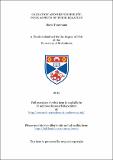Causation and responsibility : four aspects of their relation
Abstract
The concept of causation is essential to ascribing moral and legal responsibility since the only way an
agent can make a difference in the world is through her acts causing things to happen. Yet the extent
and manner in which the complex features of causation bear on responsibility ascriptions remain
unclear. I present an analysis of four aspects of causation which yields new insights into different
properties of responsibility and offers increased plausibility to certain moral views.
Chapter I examines the realist assumption that causation is an objective and mind-independent
relation between space-time located relata – a postulate meant to provide moral assessment with a
naturalistic basis and make moral properties continuous with a scientific view of the world. I argue that
such a realist stance is problematic, and by extension so are the views seeking to tie responsibility
attributions to an objective relation.
Chapter II combines the context sensitivity of causal claims with the plausible idea that
responsibility ascriptions rest on the assessment of causal sequences relating agents and consequences.
I argue that taking context sensitivity seriously compels us to face a choice between moral contrastivism
and a mild version of scepticism, viz. responsibility is not impossible, but ultimately difficult to identify
with confidence. I show why the latter view is preferable.
Chapter III explores the concern that group agents would causally (and morally) overdetermine
the effects already caused by their constituent individuals. I argue that non-reductive views of agency
and responsibility lack a coherent causal story about how group agents impact the world as relatively
independent entities. I explain the practical importance of higher-order entities and suggest a fictionalist
stance towards group agency talk.
Chapter IV analyses the puzzle of effect selection – if causes have infinitely many effects, but
only one or a few are mentioned in causal claims, what determines their selection from the complete set
of consequents? I argue that the criteria governing the difference between effects and by-products lack
clarity and stability. I use the concerns about appropriate effect selection to formulate an epistemic
argument against consequentialism.
Type
Thesis, PhD Doctor of Philosophy
Collections
Items in the St Andrews Research Repository are protected by copyright, with all rights reserved, unless otherwise indicated.

